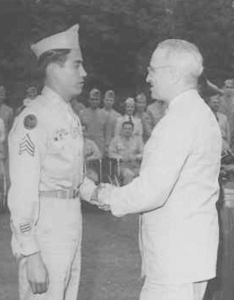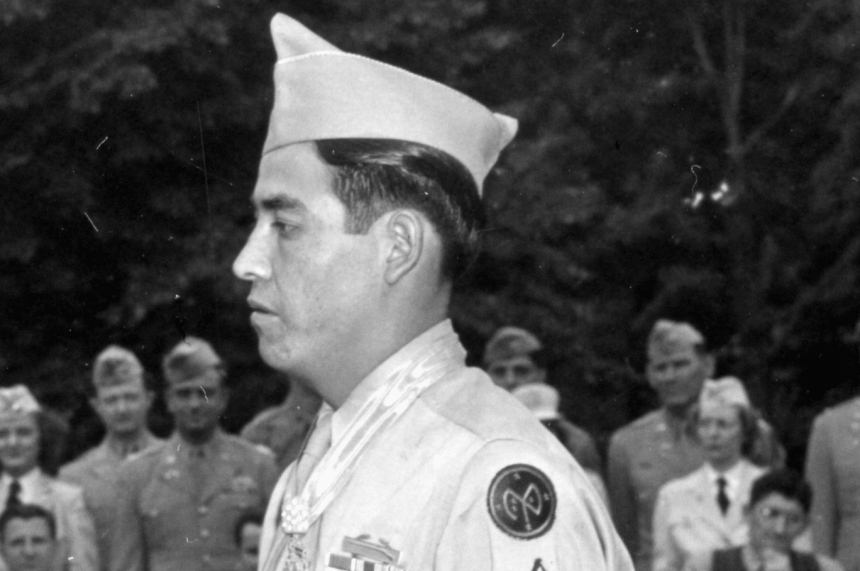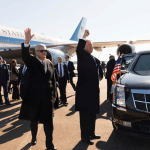As I was sitting in our conference room trying to stay awake during a long and drawn-out meeting on budgets and manning, my mind began to wander. My eyes began to roam and fixated on a row of photos encased in a wooden frame in the back of the room. The title across the top of the dozen or so photos said, “Ryukyu Islands Medal of Honor Recipients.”
Later that day, I decided to go back into the conference room and take a closer look at the photos. I was staring at a row of heroes who had served here during the Battle of Okinawa, which was the final major and one of the bloodiest battles of World War II. On April 1, 1945, more than 60,000 soldiers and marines stormed the beaches. After two months of fighting, there were 50,000 U.S. casualties including more than 12,500 U.S. personnel killed or missing.

Okinawan civilians who were caught between the Japanese Imperial Army and the U.S. military suffered the most with an estimated 150,000 civilians being killed during the timespan. Another 110,000 Japanese military also died.
As I drive to and from work each day, I marvel at this island’s beauty, safety, and calmness. This place is the definition of peace. During the war, this literal paradise must have been more like a hardened, burning hellscape with very few places to hide. Those statistics I just laid out helped me realize how brutal the conditions must have been for the men in the photos in the conference room.
I noticed the last photo in the row had a Hispanic name differing from the rest of the group – Alejandro Ruiz. After doing some research, I found that Pvt. 1st Class Ruiz was the only Hispanic American soldier to receive the Medal of Honor in the Ryukyu Islands battle campaign. Since my wife and sons are Hispanic, I was intrigued to find out more.
I began doing some research and found out that his children are still living. Between digging up info in the Medal of Honor archives, piecing together parts of the story, and interviewing one of his daughters, I was able to tell the tale of this hero’s journey. Unfortunately, most of this took place before things were more equal for Hispanic Americans. While writing this column, I was amazed at how poorly a national hero was treated. I did learn some valuable insights from his story, though, and I hope you will too.
Reviving the memory of Ruiz
Pvt. 1st Class Alejandro Ruiz sighed with a groan as he sat down on a flat rock overlooking one of the most spectacular views he had ever seen. He reached into his pocket and pulled out his cigarette as his mind began racing on what had just happened.
A rustling noise jarred him out of deep thought as he looked down at the rattling matchbox in his hand. He struggled to strike a match against the grained surface on the side of the box as his hands shook violently from a mixture of shock, adrenaline, and terror. The cigarette nearly fell out of his mouth as he noticed the steady trickle of blood coming from his leg. He had been shot.
It had felt like yesterday when Ruiz stood in the Texas heat wiping the sweat from the back of his sun-drenched neck. His friend had found him while loading cattle into a truck for his employer. The friend began to tell Ruiz that another man was planning to ask Eliza Martinez, Ruiz’s love interest, for her hand in marriage.
Without hesitation, Ruiz jumped into the cattle truck and sped off to find his love and beat his competitor in popping the question.
Before Ruiz could find Eliza, the police found him with the stolen truck and cattle. After an arrest, a bit of jail time, and a court hearing, the judge’s unsympathetic ear gave Ruiz a choice: Join the Army and the war effort or go to prison.
In a matter of days, Ruiz found himself in an Army uniform learning to be a soldier. After the abbreviated basic training and a whirlwind of travel and adventure across the Pacific, Ruiz found himself in the Okinawan inland wilderness as a point man for his infantry platoon during the first wave of Soldiers to arrive to take the strategic location.
Four days into his 20s, Ruiz found himself amid a foreign, hostile land that most Americans had never heard of. His platoon’s mission, which was cleverly named Operation Pocket, was to clear a way for the coordinated attack on the island. Continually, his platoon was harassed and delayed by explosions, from mortar shells, artillery, and machine-gun fire. Surrounded by charred cliffs, sharp rocks, boulders, and burning vegetation, Ruiz’s battleground was filled with smoke and jagged rocks up to 40 feet high on either side of him. Their job was to take the ridge northeast of Gusukuma Village.
As they closed in on their objective, that’s when the nightmare began. Ambush! Machine-gun and rifle shots rang out in a deadly chorus leaving the first few of Ruiz’s platoon mates lying on the ground dead or in the final throws of dying. The platoon, exposed on the ridgeline, scattered to find cover from the expertly camouflaged pillbox sending endless streams of bullets, mortar, and grenades directly onto the platoon’s position.
With everyone in the platoon injured or dead, except for the commanding officer and himself, Ruiz grabbed a browning automatic rifle from a fallen comrade and charged the pillbox through a hail of gunfire. He thrust the barrel into the pillbox and pulled the trigger to hear a heart-stopping…click. The BAR had been damaged and wouldn’t fire.
Several enemy soldiers saw an opportunity and ran from the pillbox to confront Ruiz with bayonets. Ruiz used his malfunctioning rifle as a club and fought them off. He ran back down the ridge with nearly every sight set on Ruiz in a hail of gunfire. Unharmed and undeterred, he ran back to his platoon’s position and grabbed another BAR. He test-fired it to make sure he would arrive back into the enemy’s position with more than an awkward equivalent of a Louisville Slugger.
For the third time, Ruiz ran the path. By now, every enemy soldier was gunning for Ruiz who seemed invulnerable and unfazed. Ruiz made his way to the pillbox, aimed, and pulled the trigger. He emptied his weapon into the pillbox and threw grenades, killing more than a dozen of his foes.
Ruiz had saved the mission and his platoon.
“All of Ruiz’s actions were voluntary. At no time did anyone issue an order to him. His action has been called, by men who went through three campaigns: the most courageous piece of work they have ever seen on the battlefield. Alone and unaided, he faced almost certain death. By his bravery far and above the call of duty, PFC Ruiz eliminated within a few minutes an enemy position so situated and so constructed that it would have held up the advance of his company for one week,” Capt. Malloy wrote in his eyewitness summary of Ruiz’s heroic actions.
After the war, Ruiz returned home to find that his love, Eliza, never considered marrying the other suitor. She had waited for Ruiz to return. Ruiz found her in a small Texas town and immediately asked her to marry him.
They set a date and began hurriedly planning the ceremony. Unbeknownst to Ruiz, the decision to award him the Medal of Honor had been made, and an officer was dispatched to Texas to find the hero and give him the good news. Orders had been delivered for Ruiz to report to the White House.
A few weeks later, after being wined and dined in the nation’s capital with no other than President Harry Truman, Ruiz returned to his family in Texas with one of the most prestigious awards for valor in the history of mankind hanging around his neck.

The Ruiz family all planned to go into El Paso and celebrate the honor he had brought upon their family with a fancy dinner. When the family arrived, they found signs on the windows saying “No Dogs or Mexicans Allowed.”
Although Ruiz was a verified and celebrated national hero, he wasn’t welcome in fine dining establishments in the area.
“My father never let the hatred and discrimination against us embitter him. He focused on serving his country with patriotism in his heart and he took care of his family,” Celia Ruiz, an employment rights lawyer and daughter of Alejandro Ruiz, said. “He held belief in a day where we would see equality. He was a great role model for me and my brother.”
Ruiz went on to serve 20 years in the Army. He fought in the Korean War and was assigned to Okinawa several times during his career. In his 20th year in the military, Ruiz went to visit his mother in Gilroy, Calif., and was hit by a Greyhound bus. Although Ruiz survived that too, it was enough to knock him out of the Army medically. After reconstructive surgery and intense physical therapy, Ruiz continued to contribute by attending and participating in patriotic celebrations designed to honor veterans and their sacrifices.
“My dad is my personal hero. I knew he was a hero all my life. Having him in my life made a big difference for me,” Celia continued. “My father never talked about his military experience. He was a soldier, a brave man, and when action was required, he took action, almost daring the enemy to end his life. He never cried, he never ran away, he never asked anyone to do what he would not do.”
Years after the incident at the restaurant, the town of Visalia honored Ruiz by naming the “Alejandro R. Ruiz Sr. Park” after him. Ruiz passed away at age 86 in 2009.
- When his unit was stopped by a skillfully camouflaged enemy pillbox, he displayed conspicuous gallantry and intrepidity above and beyond the call of duty. His squad, suddenly brought under a hail of machinegun fire and a vicious grenade attack, was pinned down. Jumping to his feet, Pfc. Ruiz seized an automatic rifle and lunged through the flying grenades and rifle and automatic fire for the top of the emplacement. When an enemy soldier charged him, his rifle jammed. Undaunted, Pfc. Ruiz whirled on his assailant and clubbed him down. Then he ran back through bullets and grenades, seized more ammunition and another automatic rifle, and again made for the pillbox. Enemy fire now was concentrated on him, but he charged on, miraculously reaching the position, and in plain view he climbed to the top. Leaping from one opening to another, he sent burst after burst into the pillbox, killing 12 of the enemy and completely destroying the position. Pfc. Ruiz’s heroic conduct, in the face of overwhelming odds, saved the lives of many comrades and eliminated an obstacle that long would have checked his unit’s advance







